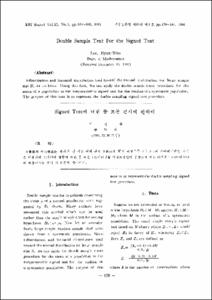급변하는 세계경제환경 속의 남북경협에 관한 정책연구
- Alternative Title
- A Study of the Policy Direction for the South-North Economic Cooperation in the Period of Reshuffling World Economic Circumstances
- Abstract
- 본 연구는 우선 급변하는 세계경제환경의 흐름을 살펴보고 이에 입각하여 남, 북경협의 필요성과 문제점을 분석·평가 하였다. 그리고 이를 바탕으로 남, 북경협의 바람직한 정책적 방향을 모색하였다. 연구결과 변모하는 세계경제환경아래에서 나타난 남국경협의 문제점은 첫째, 남북경협의 일환으로 이루어지는 남북간 교역을 국가간 교역이 아닌 민족내부거래로 인정하는 문제를 둘러싸고 한국과 WTO체제 또는 국제사회간의 갈등이 유발될 수 있다는 점 둘째, 형행『남북교류협력에 관한 법률』이 자율과 개방화시대에 맞지않게 정부규제조항이 많고 시의성에 부합되지 않은 내용들이 들어 있다는 점 셋째, 북한이 한국정부를 배제하고 민간레벨의 남북경협을 원하고 있을 뿐만 아니라 이와 관련하여 주변4강 특히 미국과 일본의 북한진출이 더욱 가속화될 것이며 이에 따른 견제와 간섭도 더욱 심화될 것이란 점 넷째, 세계경제환경에 신속히 대응하고 이와 깊은 연관을 가지고 있는 남북경제협력을 보다 시의성있고 적실성있게 해결하기 위해서는 남북경협 관련정부조긱이 일관성과 효율성을 가지고 유기적으로 연계되어 문제의 사안에 따른 해결책을 공동으로 개발해야 됨에도 불구하고 현재 우리의 현실은 경협 관련부서간의 정책일관성의 실종, 부처이기주의나 업부협조 실패, 그리고 조직의 방만성 등으로 경협의 효율적 달성을 이루어 낼수 없다는 점 등이다. 이러한 문제를 해결키 위한 바람직한 남북경협의 정책방향이 다각적인 시각에서 강구되어 제시되었다.
This paper analyzes the prospects for the economic cooperation between South Korea and North Korea. This paper also investigates the existing problems regarding its economic cooperation in the near future between the two countries and finds a possible solution for them. There are several existing problems such as the differences in government regulations, laws, trade pressure from foreign countries, and political intentions which acts a barrier of the trade expansion between the countries. In addition, the inharmonious cooperation among inter governmental becomes a serious problem at this point.
As a conclusion, this paper argues that both countries' policies toward economic cooperation should emphasize on the economic position rather than the political position. On the other hand, to reduce a possible trade conflict against foreign countries by increasing economic cooperation between two countries, both countries should prepare a political strong reason with a mutual confidence and its economic interests. Also both countries should implement policy for the adaptation to the external hostile economic environments which has been changed drastically. Finally, it is necessary for South Korea to establish a organic cooperation among inter governmentals to improve its economic cooperation.
This paper analyzes the prospects for the economic cooperation between South Korea and North Korea. This paper also investigates the existing problems regarding its economic cooperation in the near future between the two countries and finds a possible solution for them. There are several existing problems such as the differences in government regulations, laws, trade pressure from foreign countries, and political intentions which acts a barrier of the trade expansion between the countries. In addition, the inharmonious cooperation among inter governmental becomes a serious problem at this point.
As a conclusion, this paper argues that both countries' policies toward economic cooperation should emphasize on the economic position rather than the political position. On the other hand, to reduce a possible trade conflict against foreign countries by increasing economic cooperation between two countries, both countries should prepare a political strong reason with a mutual confidence and its economic interests. Also both countries should implement policy for the adaptation to the external hostile economic environments which has been changed drastically. Finally, it is necessary for South Korea to establish a organic cooperation among inter governmentals to improve its economic cooperation.
- Issued Date
- 1996
- Type
- Research Laboratory
- Alternative Author(s)
- Lee,Byung-Chul
- Publisher
- 사회과학논집
- Language
- kor
- Rights
- 울산대학교 저작물은 저작권에 의해 보호받습니다.
- Citation Volume
- 5
- Citation Number
- 3
- Citation Start Page
- 175
- Citation End Page
- 192
- Appears in Collections:
- Research Laboratory > Journal of social science
- 파일 목록
-
-
Download
 000002025303.pdf
기타 데이터 / 90.33 kB / Adobe PDF
000002025303.pdf
기타 데이터 / 90.33 kB / Adobe PDF
-
Items in Repository are protected by copyright, with all rights reserved, unless otherwise indicated.